|
Books Should Be Free Loyal Books Free Public Domain Audiobooks & eBook Downloads |
|
|
Books Should Be Free Loyal Books Free Public Domain Audiobooks & eBook Downloads |
|
Poetry |
|---|
|
Book type:
Sort by:
View by:
|
By: Walter Richard Cassels (1826-1907) | |
|---|---|
 Eidolon, or The Course of a Soul And Other Poems
Eidolon, or The Course of a Soul And Other Poems
| |
By: Walter Savage Landor (1775-1864) | |
|---|---|
 Poet Who Sleeps
Poet Who Sleeps
LibriVox readers bring you 13 versions of The Poet Who Sleeps by Walter Savage Landor. This was the weekly poetry project for December 1, 2013. | |
 Gebir
Gebir
| |
 Maid's Lament
Maid's Lament
volunteers bring you 11 recordings of The Maid's Lament by Walter Savage Landor. This was the Weekly Poetry project for August 25, 2109. ------ Walter Savage Landor was an English writer, poet, and activist. The critical acclaim he received from contemporary poets and reviewers was not matched by public popularity. As remarkable as his work was, it was equaled by his rumbustious character and lively temperament. - Summary by Wikipedia | |
 One Lovely Name
One Lovely Name
volunteers bring you 17 recordings of One Lovely Name by Walter Savage Landor. This was the Weekly Poetry project for July 26, 2020.------- Walter Savage Landor was an English writer, poet, and activist. Today he is best known for his collection of Imaginary Conversations between historical celebrities and his pithy aphoristic verses. - Summary by Algy Pug | |
By: Wilbur D. Nesbit (1871-1927) | |
|---|---|
 An Alphabet of History
An Alphabet of History
An alphabet of historical characters presented in poetical form!In their original form, the contents of this book appeared in the Chicago Sunday Tribune, which newspaper is hereby thanked for the privilege of reproducing this Alphabet | |
By: Wilfred S. Skeats | |
|---|---|
 The Song of the Exile—A Canadian Epic
The Song of the Exile—A Canadian Epic
| |
By: Wilhelm Busch (1832-1908) | |
|---|---|
 Max and Maurice a juvenile history in seven tricks
Max and Maurice a juvenile history in seven tricks
| |
By: William Platt | |
|---|---|
 Stories of the Scottish Border
Stories of the Scottish Border
Nothing seems to be known about Mr and Mrs William Platt, the writers of Stories of the Scottish Border. What they produced is an eccentric guidebook and history, seen partly through the ballads of the region. The book recounts the military stratagems, treachery and courage of those who struggled for control of the Border lands and of the whole country, and tells of the triumphs or tragic fate of those who took part on both sides. It also tells us stories of the Border Reivers, raiders who lived by riding out and stealing their neighbours’ livestock... | |
By: William Allingham (1824-1889) | |
|---|---|
 Twilight Voices
Twilight Voices
William Allingham was an Irish poet, diarist and editor, who wrote several volumes of lyric verse. | |
 Rhymes For The Young Folk
Rhymes For The Young Folk
Popular for his simple, delicate poetry for children, this Irishman wrote these verses for his three children, Gerald, Eva and Henry, and others like them. Typically, they touch on fairies and nature. | |
By: William Barksted (fl. 1611) | |
|---|---|
 Seven Minor Epics of the English Renaissance (1596-1624)
Seven Minor Epics of the English Renaissance (1596-1624)
| |
By: William Barnes (1801-1886) | |
|---|---|
 Poems of Rural Life in the Dorset Dialect
Poems of Rural Life in the Dorset Dialect
| |
By: William Bell Scott (1811-1890) | |
|---|---|
 End of Harvest
End of Harvest
Librivox volunteers bring you eight readings of End of Harvest, by William Bell Scott. This is the fortnightly poetry project for November 9, 2014. | |
By: William Benson (1682-1754) | |
|---|---|
 Letters Concerning Poetical Translations And Virgil's and Milton's Arts of Verse, &c.
Letters Concerning Poetical Translations And Virgil's and Milton's Arts of Verse, &c.
| |
By: William Blake (1757-1827) | |
|---|---|
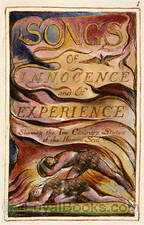 Songs of Innocence and Experience
Songs of Innocence and Experience
“Tiger, tiger, burning bright/In the forests of the night/ What immortal hand or eye/ Could frame thy fearful symmetry?” These often quoted lines are part of The Tiger in William Blake's Songs of Innocence and Experience. In 1789, William Blake released a limited edition of the book. Being a gifted artist, poet and printmaker, he undertook to personally publish all his work himself through a very painstaking but highly artistic process of etching, thereby transferring his drawings and poems individually onto copper plates by hand... | |
 Poems of William Blake
Poems of William Blake
Songs of Innocence and of Experience: Shewing the Two Contrary States of the Human Soul are two books of poetry by the English poet and painter, William Blake. Although Songs of Innocence was first published by itself in 1789, it is believed that Songs of Experience has always been published in conjunction with Innocence since its completion in 1794. Songs of Innocence mainly consists of poems describing the innocence and joy of the natural world, advocating free love and a closer relationship with God, and most famously including Blake’s poem The Lamb... | |
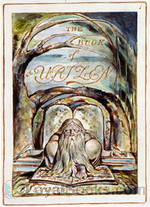 The First Book of Urizen
The First Book of Urizen
The Book of Urizen is one of the major prophetic books of the English poet William Blake, illustrated by Blake’s own plates. It was originally published as The First Book of Urizen in 1794. Later editions dropped the word “first”. The book takes its name from the character Urizen in Blake’s mythology, who represents alienated reason as the source of oppression. The book describes Urizen as the “primeaval priest”, and describes how he became separated from the other Eternals to create his own alienated and enslaving realm of religious dogma... | |
 Milton: a Poem
Milton: a Poem
Milton: a Poem is an epic poem by William Blake, written and illustrated between 1804 and 1810. Its hero is John Milton, who returns from heaven and unites with Blake to explore the relationship between living writers and their predecessors. While on earth, Milton also unites with his feminine aspect, Ololon. The poem describes progress toward the apocalyptic union of living and dead, internal and external reality, and male and female. . | |
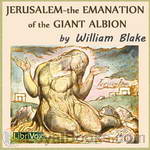 Jerusalem - The Emanation of the Giant Albion
Jerusalem - The Emanation of the Giant Albion
The epic poem Jerusalem was in Blake's own opinion his masterpiece. It is the last of the great prophetic books. Originally produced as an engraved book of 100 pages (only one copy of which was every fully finished in the colouring), the poem develops and unifies many of the themes Blake had been exploring in earlier works. It is a complex and powerful work, full of dramatic imagery and sublime poetry. You might think of it like a poetic version of a Wagner opera. This is poetry as if your life depended on it... | |
 Marriage of Heaven and Hell
Marriage of Heaven and Hell
The work was composed between 1790 and 1793, in the period of radical foment and political conflict immediately after the French Revolution. The title is an ironic reference to Emanuel Swedenborg's theological work Heaven and Hell published in Latin 33 years earlier. Swedenborg is directly cited and criticized by Blake several places in the Marriage. Though Blake was influenced by his grand and mystical cosmic conception, Swedenborg's conventional moral structures and his Manichean view of good... | |
 Marriage of Heaven and Hell (version 2)
Marriage of Heaven and Hell (version 2)
"The road of excess leads to the palace of wisdom."The Marriage of Heaven & Hell is William Blake’s masterpiece – a piously blasphemous reimagining of the duality of good and evil as an eternal dance of equally essential polarities.Good, in Blake’s complex cosmology, is defined by a blind deference to the external, rational order embodied by the tyrant and the priest. Evil is the chaotic and revolutionary impulse that defies all reason and authority.While Blake’s sympathies are clearly with the Romantic revolutionary, he argues for the necessity of both sides, which create balance through their eternal opposition. | |
By: William Butler Yeats (1865-1939) | |
|---|---|
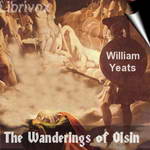 The Wanderings of Oisín
The Wanderings of Oisín
This narrative poem is composed in three parts, and consists of a dialogue between the aged Irish hero Oisín and St. Patrick. Oisín relates his three-hundred year sojourn in the immortal isles of Faerie. In the isles, Oisín married the beautiful Sidhe Niamh: together they traveled, feasted, and quested. At last Oisín succumbs to the temptation to return and visit the lands of mortal men: inadvertently slipping from his faerie horse, his body touches the ground and instantly puts on the flesh of a decrepit old man. Oisín describes various islands and what he did there: contrasting his noble deeds with the degenerate weakness of the present generation. | |
 The Wild Swans at Coole
The Wild Swans at Coole
The Wild Swans at Coole is a collection of poems by William Butler Yeats, first published in 1917. It is also the name of a poem in that collection. The Wild Swans at Coole is in the "middle stage" of Yeats' writing and is concerned with, amongst other themes, Irish nationalism and the creation of an Irish aesthetic. | |
 Crossways
Crossways
The first collection by Irish-born poet William Butler Yeats. Many decades before his mysterious and austere Modernist verse earned him a nobel prize, Yeats achieved renown as one of the last major poets in the High Romantic tradition. These poems showcase his Celtic imagination, his love for Irish folk-tales, and his commitment to the Romantic ideal of love. | |
 In The Seven Woods
In The Seven Woods
In the Seven Woods (1904) is Yeats's first twentieth-century poetry collection. Its fourteen poems show him moving steadily away from the decisively Romantic diction of his earlier work. Here we hear a poetic voice that is at once more individual, colloquial and dramatic than previously. In addition, several poems sound a note of bitter lamentation over the marriage in 1903 of Maud Gonne, Yeats's great love and muse, to John MacBride. | |
 In The Seven Woods Being Poems Chiefly of the Irish Heroic Age
In The Seven Woods Being Poems Chiefly of the Irish Heroic Age
| |
 Dolls
Dolls
William Butler Yeats was an Irish poet and one of the foremost figures of 20th-century literature. A pillar of both the Irish and British literary establishments, his earliest volume of verse was published in 1889, and its slow-paced and lyrical poems display Yeats's debts to Edmund Spenser, Percy Bysshe Shelley, and the poets of the Pre-Raphaelite Brotherhood. From 1900, Yeats's poetry grew more physical and realistic. In 1923, he was awarded the Nobel Prize in Literature. | |
By: William Carlos Williams (1883-1963) | |
|---|---|
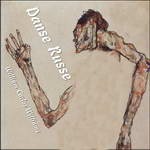 Danse Russe
Danse Russe
Williams spent his life as a doctor practicing pediatric medicine in northern New Jersey, a few miles west of New York City. During the work day, between seeing patients, he often dashed off poems on the backs of blank prescription pads that he kept in his pocket. This particular poem was written in just such a spontaneous way, after seeing the Russian Ballet perform in Manhattan. Each of the 16 readers in this collection took the challenge to make the same kind of leap – reading it spontaneously. | |
 Selected Early Poems of William Carlos Williams
Selected Early Poems of William Carlos Williams
Williams was born in Rutherford, New Jersey, a community near the city of Paterson. His father was an English immigrant, and his mother was born in Puerto Rico. He attended public school in Rutherford until 1897, then was sent to study at Château de Lancy near Geneva, Switzerland, the Lycée Condorcet in Paris, France, for two years and Horace Mann School in New York City. Then, in 1902, he entered the University of Pennsylvania Medical School. During his time at Penn, Williams befriended Ezra Pound, Hilda Doolittle (best known as H... | |
By: William Cavendish (1592-1696) | |
|---|---|
 To The Duchesse of Newcastle, On Her New Blazing-World
To The Duchesse of Newcastle, On Her New Blazing-World
volunteers bring you 14 recordings of To The Duchesse of Newcastle, On Her New Blazing-World by William Cavendish. This was the Weekly Poetry project for November 11, 2018. ------ Margaret Cavendish's book, "Blazing World" is a fanciful depiction of a satirical, utopian kingdom in another world that can be reached via the North Pole. It is "the only known work of utopian fiction by a woman in the 17th century, as well as an example of what we now call 'proto-science fiction'. The book inspired this notable sonnet by her husband, William Cavendish, 1st Duke of Newcastle-upon-Tyne, which celebrates her imaginative powers, and was included in her book. ~ Summary from Wikipedia | |
By: William Collins (1721-1759) | |
|---|---|
 The Poetical Works of William Collins With a Memoir
The Poetical Works of William Collins With a Memoir
| |
By: William Combe (1742-1823) | |
|---|---|
 The First of April Or, The Triumphs of Folly: A Poem Dedicated to a Celebrated Duchess. By the author of The Diaboliad.
The First of April Or, The Triumphs of Folly: A Poem Dedicated to a Celebrated Duchess. By the author of The Diaboliad.
| |
 An Heroic Epistle to the Right Honourable the Lord Craven (3rd Ed.)
An Heroic Epistle to the Right Honourable the Lord Craven (3rd Ed.)
| |
 Tour of Dr. Syntax in Search of the Picturesque
Tour of Dr. Syntax in Search of the Picturesque
“To bury these, to christen those, And marry such fond folks who chose To change the tenor of their life And risk the matrimonial strife.” This was the humdrum life of Dr. Syntax before he set out on his bizarre and hilarious adventures, presented here in the form of satirical poem in 26 cantos. It’s a lot of fun! | |
By: William Cowper (1731-1800) | |
|---|---|
 The Task and Other Poems
The Task and Other Poems
| |
 The Diverting History of John Gilpin
The Diverting History of John Gilpin
| |
 Retired Cat
Retired Cat
William Cowper was an English poet and hymnodist. One of the most popular poets of his time, Cowper changed the direction of 18th century nature poetry by writing of everyday life and scenes of the English countryside. In many ways, he was one of the forerunners of Romantic poetry. His religious sentiment and association with John Newton (who wrote the hymn "Amazing Grace") led to much of the poetry for which he is best remembered. His poem "Light Shining out of Darkness" gave English the phrase: "God moves in a mysterious way/His wonders to perform." Wikipedia | |
 Inscription For A Stone
Inscription For A Stone
volunteers bring you 18 recordings of Inscription For A Stone by William Cowper. This was the Weekly Poetry project for May 12, 2019. ------ INSCRIPTION FOR A STONE Erected at the sowing of a grove of oaks at Chillington, the Seat of T. Giffard, Esq, 1790 | |
 Negro's Complaint
Negro's Complaint
volunteers bring you 8 recordings of The Negro's Complaint by William Cowper. This was the Fortnightly Poetry project for February 9, 2020. ------ Cowper, an English poet, wrote a poem called "The Negro's Complaint" which rapidly became very famous, and was often quoted by Martin Luther King Jr. during the 20th century civil rights movement. - Summary by Wikipedia | |
By: William Cullen Bryant (1794-1878) | |
|---|---|
 Journey of Life
Journey of Life
LibriVox volunteers bring you 14 recordings of The Journey of Life by William Cullen Bryant. This was the Weekly Poetry project for December 23, 2012.William Cullen Bryant was an American romantic poet, journalist, and long-time editor of the New York Evening Post. His poetry has been described as being "of a thoughtful, meditative character, and makes but slight appeal to the mass of readers." ( | |
 Midsummer
Midsummer
LibriVox volunteers bring you 14 recordings of Midsummer by William Cullen Bryant. This was the Weekly Poetry project for June 23, 2013.This poem taken from the Poetical Works of William Cullen Bryant, Household Edition. | |
 Song For New Year's Eve
Song For New Year's Eve
LibriVox volunteers bring you 11 recordings of A Song For New Year's Eve by William Cullen Bryant. This was the Weekly Poetry project for December 30, 2012.William Cullen Bran was an American Romantic poet. He wrote this poem in 1859. We are recording it to celebrate the end of 2012 and the beginning of 2013. | |
 To The Fringed Gentian
To The Fringed Gentian
William Cullen Bryant was an American romantic poet, journalist, and long-time editor of the New York Evening Post. He is also remembered as one of the principal authorities on homeopathy and as a hymnist for the Unitarian Church, both legacies of his father's enormous influence on him. - Summary by Wikipedia | |
By: William Dean Howells (1837-1920) | |
|---|---|
 The Daughter of the Storage And Other Things in Prose and Verse
The Daughter of the Storage And Other Things in Prose and Verse
| |
 Poems
Poems
| |
 Hope
Hope
volunteers bring you 16 recordings of Hope by William Dean Howells. This was the Weekly Poetry project for July 7, 2019. ------ A short, vivid seafaring poem that holds out hope for an afterlife, wonderfully crafted by William Dean Howells, an American novelist, literary critic, poet and playwright, nicknamed "The Dean of American Letters". He was particularly known for his tenure as editor of The Atlantic Monthly, as well as for his own prolific writings | |
By: William Edgar Brown (1866-1929) | |
|---|---|
 Echoes of the Forest
Echoes of the Forest
Twenty-six stories of first nations' origin rendered in English in verse. The author's dedication claims the stories "help us to understand that the white man and red man are brothers." His Ojibway name was Nwah-ke-nah-go-zid. The content and tone of the poems are distinctly indigenous. An extensive bibliography provides the sources for the stories. | |
By: William Ernest Henley (1849-1903) | |
|---|---|
 Poems
Poems
| |
 Lyra Heroica A Book of Verse for Boys
Lyra Heroica A Book of Verse for Boys
| |
 Hawthorn and Lavender with Other Verses
Hawthorn and Lavender with Other Verses
| |
 The Song of the Sword and Other Verses
The Song of the Sword and Other Verses
| |
By: William Falconer (1732-1769) | |
|---|---|
 Shipwreck
Shipwreck
A semi-autobiographical poem in three cantos recounts the wreck of the merchant ship Britannia. Written by William Falconer, a seaman of some experience, who survived one shipwreck himself with only two others of the 50 man crew and eventually perished in the loss of a second ship, the frigate Aurora, 20 years later. The poem is recognized for its realistic portrayal of life aboard an 18th century sailing vessel. - Summary by Fritz | |
By: William Hazlitt (1778-1830) | |
|---|---|
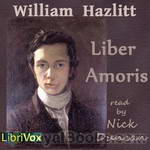 Liber Amoris
Liber Amoris
Liber Amoris is unlike anything Hazlitt wrote and probably like nothing you've come across before. On the face of it it tells the story of Hazlitt's infatuation with his landlords daughter. Hazlitt was middle aged and she young and pretty, a bit of a coquette from the sound of it. It turned out badly for Hazlitt and the book tells the story of this doomed love. Critics have always been divided about the merit of the piece. Even those who see its merit often feel more comfortable with his polished literary works, and perhaps rightly so... | |
By: William Henry Davies (1871-1940) | |
|---|---|
 Foliage: Various Poems
Foliage: Various Poems
W. H. Davies was a Welsh poet and writer. Davies spent a significant part of his life in the United Kingdom and United States, becoming one of the most popular poets of his time. Davies is usually considered one of the Georgian poets, although much of his work is atypical of the style and themes adopted by others of the genre. | |
By: William Henry Drummond (1854-1907) | |
|---|---|
 The Habitant and Other French-Canadian Poems
The Habitant and Other French-Canadian Poems
| |
 The Voyageur and Other Poems
The Voyageur and Other Poems
| |
By: William Henry Rhodes (1822-1876) | |
|---|---|
 Old Year and The New
Old Year and The New
William Henry Rhodes will long be remembered by his contemporaries at the Bar of California as a man of rare genius, exemplary habits, high honor, and gentle manners, with wit and humor unexcelled. His writings are illumined by powerful fancy, scientific knowledge, and a reasoning power which gave to his most weird imaginations the similitude of truth and the apparel of facts. W.H.L.B. | |
By: William J. Lampton (1851-1917) | |
|---|---|
 Flag and the Faithful
Flag and the Faithful
LibriVox volunteers bring you 12 recordings of The Flag and the Faithful by William J. Lampton. This was the Weekly Poetry project for January 20, 2013.William J. Lampton was the second cousin of Jane Clemens (the youngest of the three daughters of Samuel Langhorne Clemens, better known by his pen name Mark Twain.)He launched his jounalist carreer in 1877 by starting the Ashland (Kentucky) Weekly Review, with his father’s money. Lampton wrote several book, as well as humorous poems he called 'yawps'. These were printed in the New York Sun and published in Yawps and Other Things ca. 1900. | |
By: William Johnson Cory (1823-1892) | |
|---|---|
 Ionica
Ionica
| |